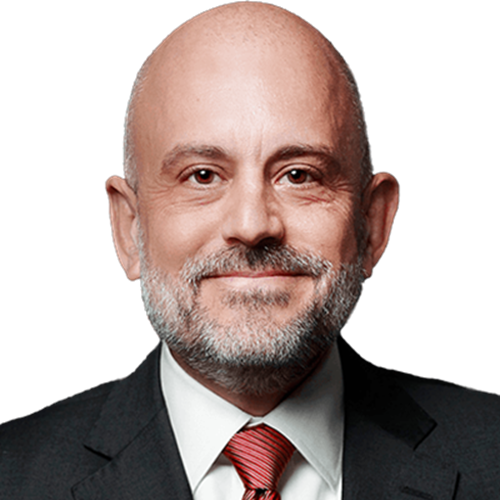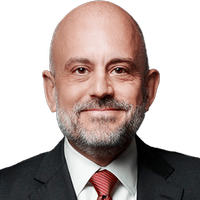Building Your Financial Plan Around Cash Flow
The process is a lot like putting a puzzle together.

Profit and prosper with the best of Kiplinger's advice on investing, taxes, retirement, personal finance and much more. Delivered daily. Enter your email in the box and click Sign Me Up.
You are now subscribed
Your newsletter sign-up was successful
Want to add more newsletters?

Delivered daily
Kiplinger Today
Profit and prosper with the best of Kiplinger's advice on investing, taxes, retirement, personal finance and much more delivered daily. Smart money moves start here.

Sent five days a week
Kiplinger A Step Ahead
Get practical help to make better financial decisions in your everyday life, from spending to savings on top deals.

Delivered daily
Kiplinger Closing Bell
Get today's biggest financial and investing headlines delivered to your inbox every day the U.S. stock market is open.

Sent twice a week
Kiplinger Adviser Intel
Financial pros across the country share best practices and fresh tactics to preserve and grow your wealth.

Delivered weekly
Kiplinger Tax Tips
Trim your federal and state tax bills with practical tax-planning and tax-cutting strategies.

Sent twice a week
Kiplinger Retirement Tips
Your twice-a-week guide to planning and enjoying a financially secure and richly rewarding retirement

Sent bimonthly.
Kiplinger Adviser Angle
Insights for advisers, wealth managers and other financial professionals.

Sent twice a week
Kiplinger Investing Weekly
Your twice-a-week roundup of promising stocks, funds, companies and industries you should consider, ones you should avoid, and why.

Sent weekly for six weeks
Kiplinger Invest for Retirement
Your step-by-step six-part series on how to invest for retirement, from devising a successful strategy to exactly which investments to choose.
When my kids were growing up, many days my wife would sit with them on the floor putting puzzles together. They would laugh and talk as they worked together arranging the pieces to create the picture on the box.
When the kids were young, the puzzles consisted of 20 pieces that could be put together without much need for the picture on the box. The older the kids got, the more complex the puzzles became and the more important the picture became for them to fully study, understand and refer back to in order to complete the puzzle.
The same is true for a financial plan. When someone is just getting started with his or her financial life, the process can seem rudimentary without much consideration. However, as assets are accumulated and life becomes more complex, the picture on the box becomes the most important part of assembling the puzzle.
From just $107.88 $24.99 for Kiplinger Personal Finance
Become a smarter, better informed investor. Subscribe from just $107.88 $24.99, plus get up to 4 Special Issues

Sign up for Kiplinger’s Free Newsletters
Profit and prosper with the best of expert advice on investing, taxes, retirement, personal finance and more - straight to your e-mail.
Profit and prosper with the best of expert advice - straight to your e-mail.
The Importance of the Picture on the Box
Think of your personal financial situation as a puzzle made up of dozens of pieces. The pieces represent all of the products, programs, thoughts, decisions, purchases, ideas, investments and anything else involving your financial life.
The picture on the box to your puzzle is your CASH FLOW. It’s where everything flows from and where everything originates. It’s where the most important decisions are made and is the most important aspect of planning to understand. You simply cannot fully put the puzzle together without the picture.
Yet, most people work around the edges of their puzzle and don’t take the time to study the picture. People will spend their time talking and debating about the pieces without considering the picture on the box. It’s similar to what often happens during financial or retirement planning. Instead of working to fulfill the picture on the box, focusing on the completion of the puzzle rather than the individual pieces, they go from one idea or adviser to the next focused on products and rates of return. The puzzle is never complete.
What is cash flow?
Cash flow is understanding where money originates. It’s about strategically using money to not only live your life but to create more income sources for yourself. When you put your focus on cash flow, it solves a hundred other decisions.
The confusing part about cash flow is that too few people understand what this really is. They believe that a monthly budget represents their cash flow. It doesn’t.
A budget is used to track expenses. It focuses on limiting them to stay within your means in order to save money. It is a mindset of scarcity and is like using a rearview mirror for managing money. A budget is merely a piece of your puzzle.
Cash flow is the picture. It focuses on where your money needs to go to fulfill the goals that you have for your future. It is like looking through a windshield to see where you are going and allows you to direct money toward creating wealth and ultimately more income. It is an abundance mindset, not a scarcity mindset.
The purpose of cash flow awareness is not simply to make ends meet, but rather to properly organize the flow of money, which allows you to create wealth and avoid debt.
How to Build a Plan Based on Cash Flow
Developing the picture on the box and assembling the pieces is a fairly straightforward process. It doesn’t require a great deal of time if you follow a few basic steps. When you think of your cash flow, break down your annual expenses into five groupings:
- Debt payments
- Tax payments
- Regular monthly expenses
- Savings and insurance transactions
- Irregular expenses throughout the year
Then list in chronological order the big-ticket items you plan to spend money on in chunks over the next five to 10 years. (This would include education, transportation, home improvements, etc.)
It is important to include the assets you plan to purchase or invest in to create more income on this list. This may be a business, rental property or some other income-producing asset you plan to acquire.
During this stage of the process, don’t think about how you will pay for these big-ticket items, just list what they are, and then circle back later to strategize as part of a financial planning process to work out the details. Take a few minutes to complete this exercise. Once you do, you’ll discover whether your current cash flow is in alignment with your plans or if adjustments need to be made.
Defining your intention for the money you have allows you to begin assembling your financial plan in a strategic, chronological manner to seek opportunities for developing new income sources. The goal is to ultimately generate enough income from your assets to satisfy these big-ticket purchases and support your entire lifestyle.
That is how financial independence is achieved.
Securities offered through Kalos Capital Inc., Member FINRA/SIPC/MSRB, and investment advisory services offered through Kalos Management Inc., an SEC registered Investment Advisor, both located at11525 Park Wood Circle, Alpharetta, GA 30005. Kalos Capital Inc. and Kalos Management Inc. do not provide tax or legal advice. Skrobonja Financial Group LLC and Skrobonja Insurance Services LLC are not an affiliate or subsidiary of Kalos Capital Inc. or Kalos Management Inc.
Securities offered only by duly registered individuals through Madison Avenue Securities, LLC. (MAS), Member FINRA & SIPC. Advisory services offered only by duly registered individuals through AE Wealth Management (“AEWM”), a registered investment adviser. Skrobonja Financial Group, LLC, Skrobonja Insurance Services, LLC, AEWM and MAS are not affiliated entities. The article and opinions in this publication are for general information only and are not intended to provide specific advice or recommendations for any individual. We suggest that you consult your accountant, tax or legal adviser with regard to your individual situation.
Profit and prosper with the best of Kiplinger's advice on investing, taxes, retirement, personal finance and much more. Delivered daily. Enter your email in the box and click Sign Me Up.

Brian Skrobonja is a Chartered Financial Consultant (ChFC®) and Certified Private Wealth Advisor (CPWA®), as well as an author, blogger, podcaster and speaker. He is the founder and president of a St. Louis, Mo.-based wealth management firm. His goal is to help his audience discover the root of their beliefs about money and challenge them to think differently to reach their goals. Brian is the author of three books, and his Common Sense podcast was named one of the Top 10 podcasts by Forbes. In 2017, 2019, 2020, 2021 and 2022, Brian was awarded Best Wealth Manager. In 2021, he received Best in Business and the Future 50 in 2018 from St. Louis Small Business.
-
 Nasdaq Leads a Rocky Risk-On Rally: Stock Market Today
Nasdaq Leads a Rocky Risk-On Rally: Stock Market TodayAnother worrying bout of late-session weakness couldn't take down the main equity indexes on Wednesday.
-
 Quiz: Do You Know How to Avoid the "Medigap Trap?"
Quiz: Do You Know How to Avoid the "Medigap Trap?"Quiz Test your basic knowledge of the "Medigap Trap" in our quick quiz.
-
 5 Top Tax-Efficient Mutual Funds for Smarter Investing
5 Top Tax-Efficient Mutual Funds for Smarter InvestingMutual funds are many things, but "tax-friendly" usually isn't one of them. These are the exceptions.
-
 Social Security Break-Even Math Is Helpful, But Don't Let It Dictate When You'll File
Social Security Break-Even Math Is Helpful, But Don't Let It Dictate When You'll FileYour Social Security break-even age tells you how long you'd need to live for delaying to pay off, but shouldn't be the sole basis for deciding when to claim.
-
 I'm an Opportunity Zone Pro: This Is How to Deliver Roth-Like Tax-Free Growth (Without Contribution Limits)
I'm an Opportunity Zone Pro: This Is How to Deliver Roth-Like Tax-Free Growth (Without Contribution Limits)Investors who combine Roth IRAs, the gold standard of tax-free savings, with qualified opportunity funds could enjoy decades of tax-free growth.
-
 One of the Most Powerful Wealth-Building Moves a Woman Can Make: A Midcareer Pivot
One of the Most Powerful Wealth-Building Moves a Woman Can Make: A Midcareer PivotIf it feels like you can't sustain what you're doing for the next 20 years, it's time for an honest look at what's draining you and what energizes you.
-
 I'm a Wealth Adviser Obsessed With Mahjong: Here Are 8 Ways It Can Teach Us How to Manage Our Money
I'm a Wealth Adviser Obsessed With Mahjong: Here Are 8 Ways It Can Teach Us How to Manage Our MoneyThis increasingly popular Chinese game can teach us not only how to help manage our money but also how important it is to connect with other people.
-
 Looking for a Financial Book That Won't Put Your Young Adult to Sleep? This One Makes 'Cents'
Looking for a Financial Book That Won't Put Your Young Adult to Sleep? This One Makes 'Cents'"Wealth Your Way" by Cosmo DeStefano offers a highly accessible guide for young adults and their parents on building wealth through simple, consistent habits.
-
 Global Uncertainty Has Investors Running Scared: This Is How Advisers Can Reassure Them
Global Uncertainty Has Investors Running Scared: This Is How Advisers Can Reassure ThemHow can advisers reassure clients nervous about their plans in an increasingly complex and rapidly changing world? This conversational framework provides the key.
-
 I'm a Real Estate Investing Pro: This Is How to Use 1031 Exchanges to Scale Up Your Real Estate Empire
I'm a Real Estate Investing Pro: This Is How to Use 1031 Exchanges to Scale Up Your Real Estate EmpireSmall rental properties can be excellent investments, but you can use 1031 exchanges to transition to commercial real estate for bigger wealth-building.
-
 Should You Jump on the Roth Conversion Bandwagon? A Financial Adviser Weighs In
Should You Jump on the Roth Conversion Bandwagon? A Financial Adviser Weighs InRoth conversions are all the rage, but what works well for one household can cause financial strain for another. This is what you should consider before moving ahead.
